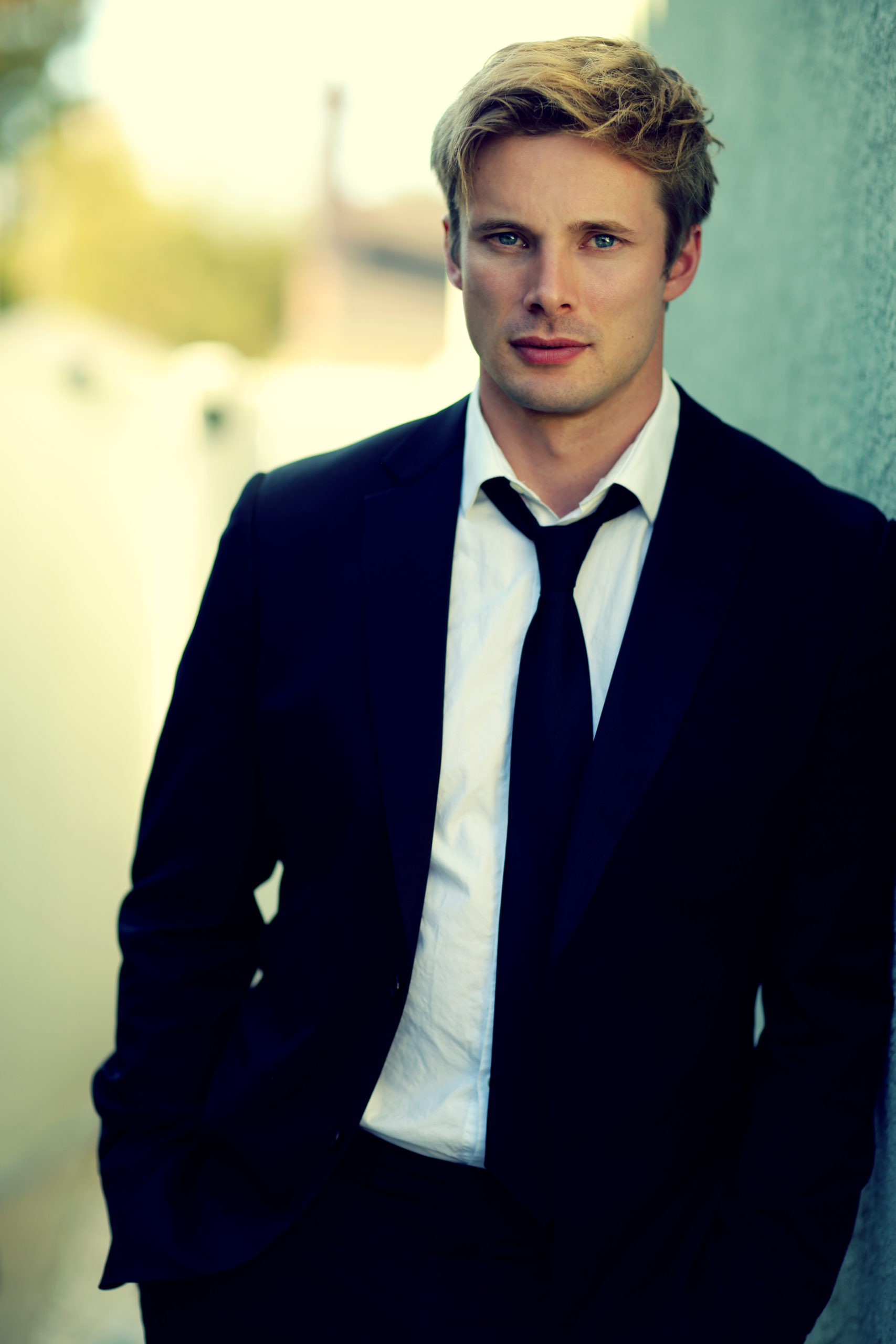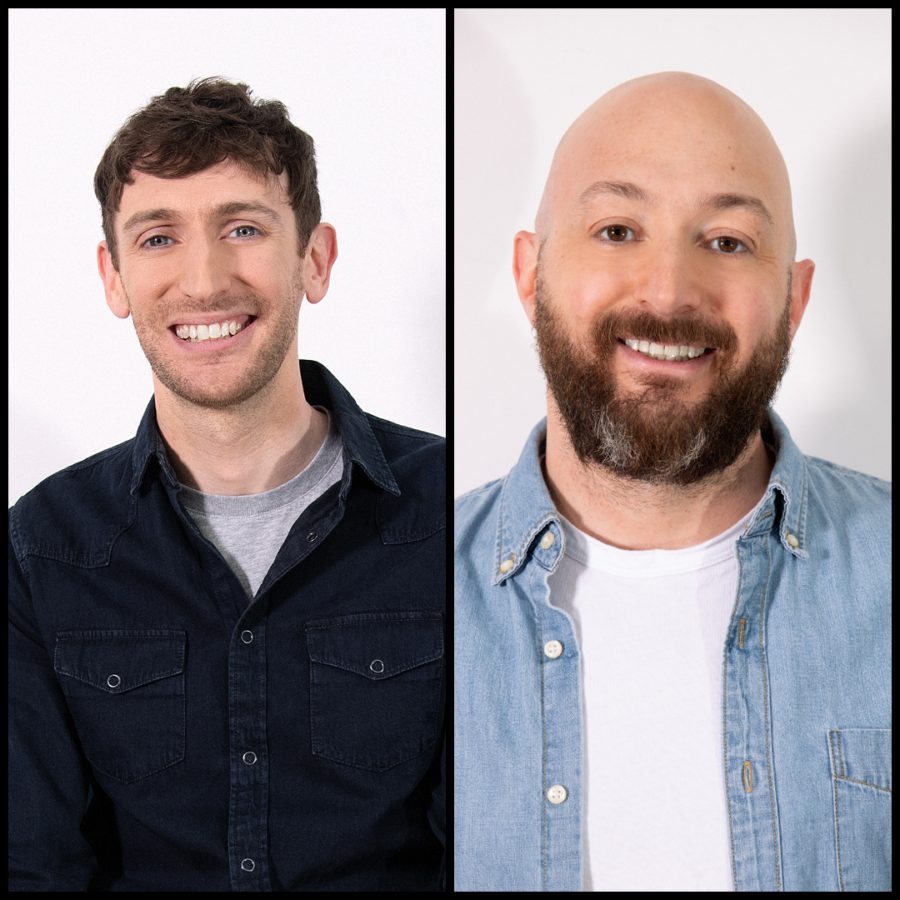Exclusive Interview: Leading Man Bradley James Talks About Going To War With “The Liberator”

Netflix’s newest animated series, a World War II epic called The Liberator, is sure to go down in history for two reasons. Firstly, because it features the first-ever use of trioscope: a unique blend of CGI and live-action that will hopefully do to animation what the VR backgrounds of The Mandalorian did for live-action. Secondly, because it sports an unprecedentedly diverse cast of races and cultures, promising to explore — in greater detail than any story has done before — the prejudices that pervaded even among the forces that ultimately defeated the Nazis. In this exclusive interview, Bradley James will share his thoughts on both of these milestones, all while taking us through the life and times of his character, an army officer who, in the actor’s own words, died a hero in the truest sense of the word.
Tim: This series has been made with trioscope technology, which is brand-new. Now, when I look at the trailer, it looks a lot like rotoscoping, which is an animation technique that’s been around since the 1920s. What’s the difference between the two?
Bradley: I came into this project not knowing anything about trioscope, and didn’t have much awareness of rotoscope, either. But I was told that rotoscope had a simplistic sort of process to it that creates this animated image, which I’m sure you’re familiar with. Where trioscope differs is — when I was originally describing it for people, I was sort of saying, Have you seen 300? They would go yes. And I would say, Well, what you’re watching is essentially a load of actors running around in blue screen, and they have put the background on afterwards. Trioscope is shot live action in front of a big blue space. It feels a little bit like you’re shooting a play. Then, the very talented team comes along and creates the world that happens behind you. So you have your costume, your guns, you’re holding the props — they’re all real and very much with you as you’re filming. But if a shot features a tank, they’ll create that tank out of a host of blue boxes. If you look at a rotoscoped image, you very much see all the nuances of human interaction. Even though it’s technically animated, it doesn’t block any of the performance. That was a question I had when I first spoke with Jeb Stuart, who wrote The Liberator. I had seen test screenings that they had done four or five years ago, and I had all these queries but Jeb said, Look, I had the exact same question marks when I started, and they’ve all been solved, and this is how they’ve been dealt with. And I was pleased to see that he was absolutely right. Any worries I had about trioscope immediately evaporated once I got to know how it works. I am very excited for people to see The Liberator because it’s the first time that trioscope’s been used, and I have a feeling that a large portion of the audience is going to enjoy it.
Tim: As an actor, how does performing in this setting, using these methods, differ from shooting in a more traditional manner?
Bradley: There’s certainly a change in terms of the amount of homework you have to do, largely because you’re in a studio. And you’re, as I’ve mentioned before, you’re in a big blue space. And so when you get onto the set, you have to work out what your character is going through. For example, you’re in a studio. It’s probably quite hot, because of the lights, and we have an episode where, at one point, the majority of the story takes place in the snow. You’ve got to do the work there. They’re not going to bring in actual snow for you; you’re gonna have to create that sensation of coldness, or wetness, or whatever it is. Maybe there’s a tank exploding right in front of the character. But, of course, you’re not actually seeing this, because the tank isn’t actually there, so you gotta create the world inside your mind. Playing my character, Felix Sparks, I’ve been comparing it to playing a quarterback in the sense that you have to know your role inside and out, but you also have to know everybody else’s role. Trioscope helped with that, too.
Tim: I’m glad to hear because whenever you introduce new technology onto a set, it’s kind of a gamble. You don’t know if it’s gonna help or hurt the actors. But seeing how positive your experience was, that might indicate we’ll see more trioscope in the future.
Bradley: I’ve never been so supplied with information ammunition in my entire life. It was fantastic.
Tim: As an actor, you want to play characters who have some depth to them, but Felix Sparks — the actual person — lived a very eventful life. I’m wondering, when you were taking on the role, and you were looking at that life, were there any moments or snapshots from it that really helped you find and define his character?
Bradley: One of the things that stuck with me is — Felix was the oldest of his siblings, and he was sent out at an early age to go and find work because his family wasn’t particularly well off. He traveled to both coasts trying to find work at a time when work was not in abundance. He took it upon himself to go out and not be a burden. He felt like he didn’t want to be a burden on his family. Along his journey, there are stories of him hopping on freight trains, trying to avoid getting mugged and hanging out with homeless people and drifters and what have you. Before he knew it, he found his way into the army. He had an appreciation for life, and for work ethic. That was something I held on to when we were shooting The Liberator. I think that one of the things that brought about respect from his men, is that anything he asked them to do — they knew — he would do in a heartbeat if they asked the same from him. The idea of the person at the top actually being there for you, and you wanting to do your best for that person — I got the feeling that people wanted to do their best for Felix Sparks because he would do his best for them. I think a lot of that stemmed from his formative years on the road, and that’s where I drew from.
Tim: The second world war is an event in history that pretty much everybody on the planet knows of and has some kind of preconceived notion about. Did working on this series and studying the material change your understanding of this time period in any way?
Bradley: World War Two was a big part of my education. Before I really started digging into the subject itself, I had an appreciation for — well, you’ll hear the word “sacrifice” a hell of a lot when it comes to anything war-related, not only when it comes to the military but also their families. Everyone has their own understanding of that word. I think I had it. I think what changed for me was an understanding of the depth of sacrifice. If you consider what we’re going through now, with COVID, for example, and the effects that he’s having on our lifestyle. It’s hard for a lot of people, but I don’t think we’re quite able to grasp how hard it must have been in wartime. Just think about people on the battlefield, constantly under threat of losing their life, or having their life changed by some sort of injury. Having that fear, being deprived of sleep for months on end. It’s so difficult to get your head around that and what that actually means.
Tim: Having starred in the BBC series Merlin as well as The Medicis, you aren’t a stranger to shows that are based on historical subject matter. Did you pursue these roles because you were interested in history, or did they sort of just happen to you?
Bradley: People wonder, Tim, about whether I actually belong in the modern day. Casting directors or producers look at me and they go, Well, he belongs in the past. It was a huge honor to find myself with the role of King Arthur in terms of what that means, certainly in Britain, but also around the world. I’ve been very lucky with the roles I played in that I have had a lot of passion for them. When it comes to Felix, though, I don’t think I’ve had a greater honor, largely because it’s very much telling the real life story of someone who is, by pure definition, a true hero of humanity. When you are taking on the role of a person like that, the stakes are high. You want to make him or his family or those involved — you want to make them proud.

Tim: From Saving Private Ryan to Band of Brothers to 1917, there is no shortage of World War based shows and films out there. But each production always sets out to explore one unique aspect of the conflict. With that in mind, what does The Liberator bring to the table that other shows and films have not?
Bradley: Felix Sparks found himself with a company of what at the time were known as misfits. They were people who didn’t easily fit into other units of the company. They were Mexican Americans, Native Americans, Cowboys — people that society didn’t have much of an appreciation for, army included. There were bars in the States where Mexicans and Native Americans were not allowed to enter. Felix, he finds himself with various races in his ranks and treats them just the same as he would anybody else. I think that also goes back to his upbringing in multiracial Arizona, which didn’t have the same degree of prejudice towards minorities as the rest of the country, perhaps.
Tim: And I think that’s just great because, in a lot of military movies, we don’t see a lot of characters from different cultural and racial backgrounds and when we do, the stories rarely touch on the systemic racism that pervades in both army and society.
Bradley: Right.
Tim: Got two more questions for you, and they’re a little personal. Hope you don’t mind.
Bradley: Fire away.
Tim: You were born in England, but you moved to the United States when we were fairly young. Felix sparks, on the contrary, was born in America and travelled to Europe for the war. Obviously, those are two very different experiences once you start zooming in on the details, but in a very broad sense, both you and the character you play find themselves at one point in their life thrown into a totally different world. Did your experience moving to a different place — a different continent — inform the way that you brought this character to life?
Bradley: I like the train of thought. I suppose the immediate similarity to pull from is that Felix and I are both nomadic, certainly in our early years. Moving around as a kid, your horizons expand, you become aware of different parts of the world, different cultures, different sorts of ways of living, different mindsets. I have a lot of friends from my teenage years who grew up in the same area and live in that area still, and have started families. Nothing wrong with that at all. I think there’s a degree of contentment that they have found and are living very happy lives. I think that when you are exposed to moving around, that becomes part of you. Felix’s nomadic lifestyle probably helped him when suddenly he was thrust into a war where, week after week, sometimes day after day, you’re sleeping in a different place than you were the night before. Now when I was young, moving to new schools and such, meeting new people and having to make friends quickly — I think that’s something that lends itself to the acting profession. You find yourself with a new batch of performers every time you do a job and you want to build relationships quickly, and create the best environment to work together. That was certainly the case with The Liberator because we were thrust into this fantastic project together; everyone wanted the best for it and very quickly we formed a bond that hopefully will appear on screen.
The Liberator is streaming now on Netflix


























Just cancel this bird already. The chicken is beyond cooked. It's burnt to a crisp.